Prevention of urinary crystals in cats and a little about FLUTD – holistic thoughts about diet and treatment
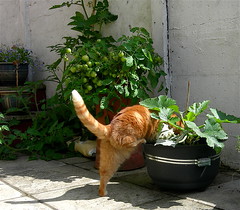 My friend Pam of FCAT keeps on sending people to my site to get information about urinary issues in cats. Last night we were talking and I said, “I really need to write an article on that.” “Yes you do, “ she answered. So here it is.
My friend Pam of FCAT keeps on sending people to my site to get information about urinary issues in cats. Last night we were talking and I said, “I really need to write an article on that.” “Yes you do, “ she answered. So here it is.
So here is the short list of what to do to help prevent crystals in your cat and a little about treating FLUTD. This is a lot more information beyond this list and I hope you read it also.
- Feed your cat like the carnivore they are. Usually this is all you need to do for prevention if your cat doesn’t have FLUTD (feline lower urinary tract disease or crystals. This would mean feeding a high protein canned, cooked or raw diet that is high in moisture and high in meat. I’m talking 80% meat or more, no grains, no dry, at least 70% moisture and very little fish. I prefer a raw diet if you can do it.
Here are some diets that work very well. I originally had a second best list of canned but you know something, with the internet you can order the canned foods even if you live in the middle of nowhere so you don’t get a second best list, these poor kitties with urinary issues need the best!To make it easy, I have links to buy all the canned food recommended below on Amazon.com. If you live in a large enough town or city you can also buy these at your local natural pet store.
- Make your own -Here is the raw food I make for my kitties. They eat this 95% of the time with a little Instinct and Weruva if I get behind in making it. See Making Crazy Awesome Cat Food – part two
. With using free range meat from the local food co-op, I spend about $50 a month per cat to make this. If I used cheaper meat it would be about half that cost and still much better than anything you can buy.
- Your local raw food made specifically for cats. In Seattle we have two great companies Darwins and Natural Pet Pantry. Both of these companies are excellent. Look for one in your area. I also love Rad cat but it is expensive if you are feeding a herd like I do. More and more companies are making raws that you can buy at your local pet store – ask around.
- Instinct canned food for cats. Any meat flavor is good. This food is 95% meat with good ingredients. Click here to buy Instinct Grain-Free Chicken Formula Canned Cat Food by Nature’s Variety
- Weruva is a great food also, up there with Instinct. There is a little potato in this one and you have to use only the grain free varieties which is about half their line. I do not recommend using the fish flavors. Click here to buy Weruva Cat Food Paw Lickin’ Chicken on Amazon.com.
- Tiki cat chicken and egg Koolina. Only this flavor, the others have too much fish! Click here to buy Tiki Cat Koolina Luau – Chicken with Egg In Chicken Consomme
- Reduce stress in the house, as stress can alter urine pH – Here are some products that can help.
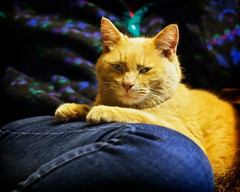
- Comfort Zone with Feliway Spray for Cats
- Bach Pet Rescue Remedy
– I like putting 3-4 drops in the water dish every time it is changed.
- Animal Apawthecary Tranquility Tonic
– this one is a strong herbal and I do not recommend it long term without the direction of a vet. The valerian is very bitter and can be a little unpleasant to take. For urinary issues I like mixing it with Animals’ Apawthecary Tinkle Tonic
which helps to soothe the bladder. The combination can be very helpful for many cats with FLUTD.
- Comfort Zone with Feliway Spray for Cats
- Glucosamine can help if there is a FLUTD component to the crystal issues. Glucosamine helps to repair the bladder wall and decrease inflammation in the bladder. I like using the Zuke’s Hip Action Treats
for cats if they will eat them. A 10lb cat needs two treats or 100mg of glucosamine a day.
- If your cat has active FLUTD (feline lower urinary tract disease) or crystals, make sure you have a vet to work with on this issue. You need to do constant monitoring of their urine. You may need to use western medicine to quickly change the pH of your cat’s urine and deal with active inflammation, infection, or crystals. Make sure there is not an urinary tract infection or stones.
If you can’t find a raw, canned is second best.
We didn’t used to have large issues with crystals in cats because guess what, if your cat eats a diet that cats were meant to eat, meaning mostly meat, they almost never have crystal issues. But as the foods have gotten more filled with grains and fillers over the years and as more cats are put on dry food these issues have come up more and more.
Crystals are painful and in male cats can cause a complete blockage of the urethra. If blockage occurs and your cat cannot pee this is an emergency and you must immediately get them to the vet or the urine can back up into their kidneys and cause kidney failure and death. Bad stuff!
Crystals can be part of a disease process in cats we call FLUTD or feline lower urinary tract disease. More about that later.
Let me just stop and say here. You need to have a vet to work with on this issue especially if you have a male cat. It is really important. You need someone to monitor what is going on with their urine.
So what is this crystal thing all about?
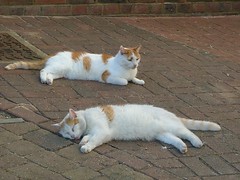 When I was in vet school we saw a lot of struvite crystals. These crystals form in the urine of cats that have high PHs, aka alkaline urine. Carnivores have acidic urine – if you eat a diet mostly of meat you do. Herbivores have alkaline urine, a natural product of eating plants. Cats should naturally have a pH of between 6-6.5. Struvite crystals often form when urine pH is 7 and higher.
When I was in vet school we saw a lot of struvite crystals. These crystals form in the urine of cats that have high PHs, aka alkaline urine. Carnivores have acidic urine – if you eat a diet mostly of meat you do. Herbivores have alkaline urine, a natural product of eating plants. Cats should naturally have a pH of between 6-6.5. Struvite crystals often form when urine pH is 7 and higher.
So why does this happen? Awhile back we started feeding our cats foods with more plants – aka grain and potato and less meat and the pH of their urine rose.
In addition crystals form easier in concentrated urine. Cats aren’t great about drinking a lot of water. When you feed a cat a diet of dry food they still don’t drink a lot and they are in a steady state of mild dehydration all the time. That leads to concentrated urine and makes it easier for crystals to form.
So we made two mistakes, we took away the moisture cats need from their food and we started feeding them like they were omnivores. It made it cheaper and more convenient for us but it didn’t work so well for our cats.
Once the food companies figured this out, many of them started adding urine acidifiers to their foods. After all it’s cheaper to add a chemical then to make a food that is good for cats with high meat content. The problem with this is that many cats now ended up with urine that was too acidic which we didn’t know would be an issue until we started seeing oxalate crystals forming in their urine, which we have seen learned tend to form when the urine pH is low aka too acidic, below 6. So in trying to solve the problem we overdid it.
Companies that make prescription diets have worked with this by adding the perfect amount of acidifiers to an omnivore diet to try to imitate the pH that would naturally happen if we just feed our cats a diet for a carnivore. Most prescription foods are made with poor protein sources and lots of fillers and chemicals. Most cats I see on prescription diets end up with health problems as they age.
It all seems like a lot of trouble when you consider that if you just feed your cat like a
carnivore who doesn’t drink a lot of water, you almost never see crystal issues.
So how do we feed our cats like the carnivores their bodies say they are and avoid crystal issues?
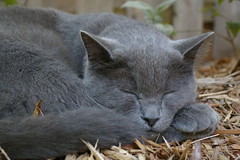 The best way is by feeding a raw, home cooked or canned diet which is grain free and very high in meat and moisture. If possible, it should also be potato free as potato is a starch and processed in the body similarly to grains and is also in the nightshade family so can cause inflammation in the body. I also recommend not feeding much fish and avoiding fish completely if your cat has had issues with crystals. The high magnesium content of fish can contribute to the issue of crystals.
The best way is by feeding a raw, home cooked or canned diet which is grain free and very high in meat and moisture. If possible, it should also be potato free as potato is a starch and processed in the body similarly to grains and is also in the nightshade family so can cause inflammation in the body. I also recommend not feeding much fish and avoiding fish completely if your cat has had issues with crystals. The high magnesium content of fish can contribute to the issue of crystals.
So that is all easy and good but there are also some other factors that come into play.
Let’s talk a little about FLUTD. Feline lower urinary tract disease is a complex of symptoms that make a cat painful in their bladder and often leads to inappropriate urination and sometimes blockage in the males. Many times these cats have painful bladders, bloody urine, straining, and crystal formulation. Most of the time there is not an urinary tract infection but sometimes there can be infection tied into all the other issues.
We still don’t completely understand this syndrome. Over the years it has had many names and many treatments. Every western conference I go to I make sure to attend the lecture on FLUTD and guess what it ends up that none of the treatments really work all that well and we still don’t know exactly what causes it. For those of you that know anything about interstitual cystitis in humans, it is a very similar disease, it may actually be the same disease. IC in humans is also very poorly understood and hard to treat.
Stress can change the pH of urine. We know when it comes to FLUTD that stress plays a large role. Make sure that your cat has as low stress as possible. Sometimes a little rescue remedy in the water can really help. Feliway pheromone spray also can be helpful, as the pheromones in it help a cat to feel at ease. If your cat has FLUTD or crystal issues and is very stressed, talk to your regular or holistic vet about anti-anxiety meds or herbs. Consider having a behaviorist come to your home and work with you to make your cat more comfortable. Animal Apawthecary makes a nice tincture called Tranquility Tonic which helps with stress, however I do not recommend this being used long term without the advise of a veterinarian and I almost always mix this one with their Tinkle Tonic which reduces bladder inflammation.
Urinary tract infections can also cause crystals. Make sure your vet runs a culture of your cat’s urine to rule out the possibility of a urinary tract infection. Just trying a trial of antibiotics does not rule in or out an urinary tract infection. Many antibiotics are also anti-inflammatory and even if there is not an urinary tract infection you will often see a temporary resolution of signs. If there is an urinary tract infection I always recommend antibiotics. It is the safest and easiest way to treat the problem. Unlike in humans who often times know right away that they have an urinary tract infection, cats often have had it for awhile before we diagnosis it. Because of this I do not recommend using herbs alone to treat UTIs in animals.
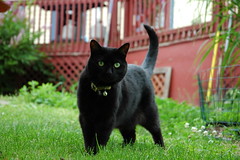 Occasionally cats can have stones. These can sometimes be dissolved out with special diets, medications or herbs. Occasionally these need to be surgically removed. X-rays will diagnosis most stones but sometimes an ultrasound is necessary. If symptoms persist consider doing the diagnostics to rule out this issue.
Occasionally cats can have stones. These can sometimes be dissolved out with special diets, medications or herbs. Occasionally these need to be surgically removed. X-rays will diagnosis most stones but sometimes an ultrasound is necessary. If symptoms persist consider doing the diagnostics to rule out this issue.
When it comes down to it, this issue is from us feeding our cats a diet they were never meant to eat. The best thing you can do for your cat friend is to put them on a healthy cat appropriate diet. When it comes to FLUTD and its other factors find a good vet team to work with. To find a holistic vet in your area see How to Find a Good Holistic Vet.
So the next time you send someone to Path With Paws, there is urinary information here!
As with all information on this website check with your cats’s veterinarian before making any changes to their treatment protocol.
